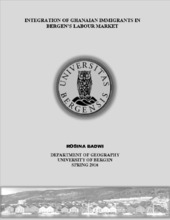Integration of Ghanaians in Bergen's Labour Market
Master thesis
Permanent lenke
https://hdl.handle.net/1956/12733Utgivelsesdato
2016-05-18Metadata
Vis full innførselSamlinger
- Department of Geography [634]
Sammendrag
Migration research in Norway has primarily focused on refugees and larger immigrant groups, and their employment outcomes rather than on small culturally different immigrant groups from countries such as Ghana. Migrants' employment processes and how they overcome hindrances in the Norwegian labour market have also received less attention in the literature. This study fills these gaps by focusing generally on Ghanaians and the factors that facilitate or hinder their labour market integration in Bergen, Norway. Based on the research objectives, I used labour market theories to explain why some Ghanaians get integrated successfully while others do not. The concept of gender was used to discuss socio-cultural ideologies among Ghanaians and how it influences the type of jobs they engage themselves in in Bergen. The concept of intersectionality unraveled various hindrances as well as opportunities that come with informants' personal identities. The social network theory helped to explore the nature of relationships between the immigrants and their contacts, and how this facilitates employment opportunities. This theory also highlighted informal employment dynamics among the informants. In Bergen, a sample of 40 informants comprising of 22 men and 18 women were interviewed. Majority of the informants are educated migrants who initially moved to Bergen for career advancement/educational opportunities. Their educational level was also generally high with 25 informants having tertiary education. The research findings indicate that most of the highly educated informants worked in menial jobs due to limited Norwegian language proficiency. These jobs were secured mainly through the assistance of Ghanaian contacts. Norwegian contacts and Norwegian language proficiency were significant factors for facilitating employment in professional and semi-professional jobs. Other facilitating strategies identified were apprenticeship', cover-up' and voluntary services. Additionally, the immigrants' ability to remit and take care of relatives in Ghana did not depend on the type of job they engage themselves but rather on their employment status.
